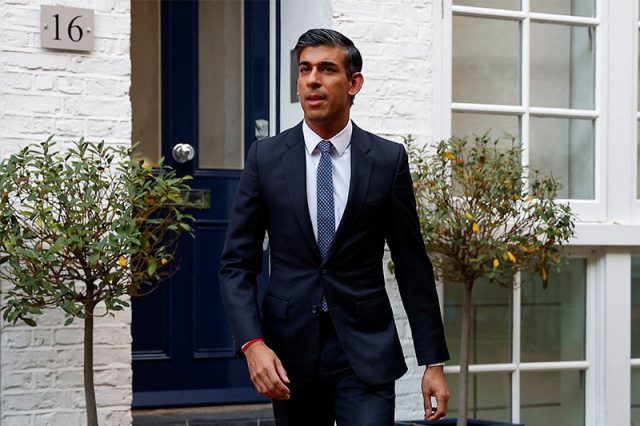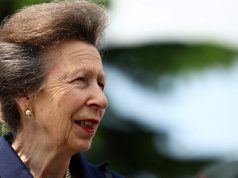
- Sunak could be declared winner after 2 p.m. (London time)
- Penny Mordaunt racing to secure backing to challenge him
- Borrowing costs ease as Boris Johnson withdraws from race
LONDON — Rishi Sunak looked set to become Britain’s next prime minister after his rival Boris Johnson quit the race, admitting he could no longer unite their party following one of the most turbulent periods in British political history.
Sunak, the 42-year-old former finance minister, could become Britain’s third prime minister in less than two months on Monday, tasked with restoring stability to a country reeling from years of political and economic turmoil.
The multi-millionaire former hedge fund boss would likely introduce deep spending cuts to try to rebuild Britain’s fiscal reputation, just as the country slides into a recession, dragged down by the surging cost of energy and food.
“The United Kingdom is a great country but we face a profound economic crisis,” Sunak said in a brief statement declaring his candidacy to lead the Conservative Party, and thereby become prime minister.
Britain has been locked in a sense of perma-crisis ever since it voted in 2016 to leave the European Union, unleashing a battle at Westminster over the future of the country that remains unresolved to this today.
The latest bout of drama has drawn dismay in foreign capitals and ridicule from the world’s press.
Johnson, the face of the Brexit vote, led his party to a landslide victory in 2019, only to be driven out of office less than three years later after a series of scandals. His successor Liz Truss lasted just 44 days before she quit over an economic policy that trashed the country’s economic credibility.
Sunak, who has not said how he plans to govern the country despite potentially being hours away from taking over, will inherit a party riven by ideology and with some lawmakers still blaming him for the demise of Johnson.
The withdrawal of the former prime minister late on Sunday also left some ministers and lawmakers feeling angry for looking foolish after they backed him to return to Downing Street, only to have to change course and endorse Sunak hours later.
Churn and instability
“Since the modern era of politics began in 1832, it’s quite without precedent to see so much churn and instability,” Anthony Seldon, a historian and political biographer, told Sky News.
Sunak could become prime minister — and the country’s first non-white premier — if Penny Mordaunt fails to get the backing of 100 lawmakers by 2 p.m. (1300 GMT) on Monday.
Mordaunt, leader of parliament’s House of Commons, has so far received the backing of around 25 politicians. Her campaign spokesperson said on Monday she was “getting the numbers”. More than 150 have backed Sunak.
Should she fail to reach the threshold, Sunak would become prime minister. If she makes it on to the ballot, the party’s members — some of whom are thought to hold Sunak responsible for bringing down Johnson — will select the winner on Friday.
Britain’s borrowing costs, which surged after Truss introduced a “mini budget” including 45 billion pounds of unfunded tax cuts, eased on Monday after Johnson pulled out of the race.
Even though Sunak has gained support from across the party’s multiple factions, analysts and economists said they still doubted whether he could unite the party.
Finance minister Jeremy Hunt — the fourth in four months — is due to present a budget on October 31, to plug a black hole in the public finances that is expected to have ballooned to up to 40 billion pounds.
Guy Hands, a private equity boss, said Britain’s dominant political party was no longer fit to run the country, and it needed to accept that its vision of Brexit had not worked. Millions were steadily getting poorer, he said.
“It’s got to move on from fighting its own internal wars and actually focus on what needs to be done in the economy, admitting some of the mistakes they’ve made in the last six years which have frankly put this country on a path to be the sick man of Europe,” he told BBC Radio.
Party unity
Investors have at least been given some reassurance that Johnson will not contest the crown. The former prime minister had raced home from a holiday in the Caribbean to see if he could enter the ballot.
He said on Sunday night that while he had secured sufficient support, he realized that he could not govern effectively “unless you have a united party in parliament”.
“Boris has bottled it,” the Metro newspaper said on its front page as many lawmakers questioned whether he had actually secured the backing of the necessary 100 lawmakers. By Sunday just more than 50 said publicly they would vote for Johnson.
Many of Johnson’s supporters had previously accused Sunak of betrayal after he quit as finance minister in the summer, triggering the rebellion that forced Johnson out.
Sunak first came to national attention when, aged 39, he became finance minister under Johnson just as the COVID-19 pandemic hit Britain, developing the successful furlough scheme.
If chosen, the former Goldman Sachs analyst would be the United Kingdom’s first prime minister of Indian origin.
His family migrated to Britain in the 1960s, a period when many people from Britain’s former colonies moved to the country to help it rebuild after the Second World War.
After graduating from Oxford University, he later went to Stanford University where he met his wife Akshata Murthy, whose father is Indian billionaire N. R. Narayana Murthy, founder of outsourcing giant Infosys Ltd.
— Writing by Kate Holton, additional reporting by Muvija M, William James, Paul Sandle, James Davey; Editing by Angus MacSwan and Hugh Lawson









